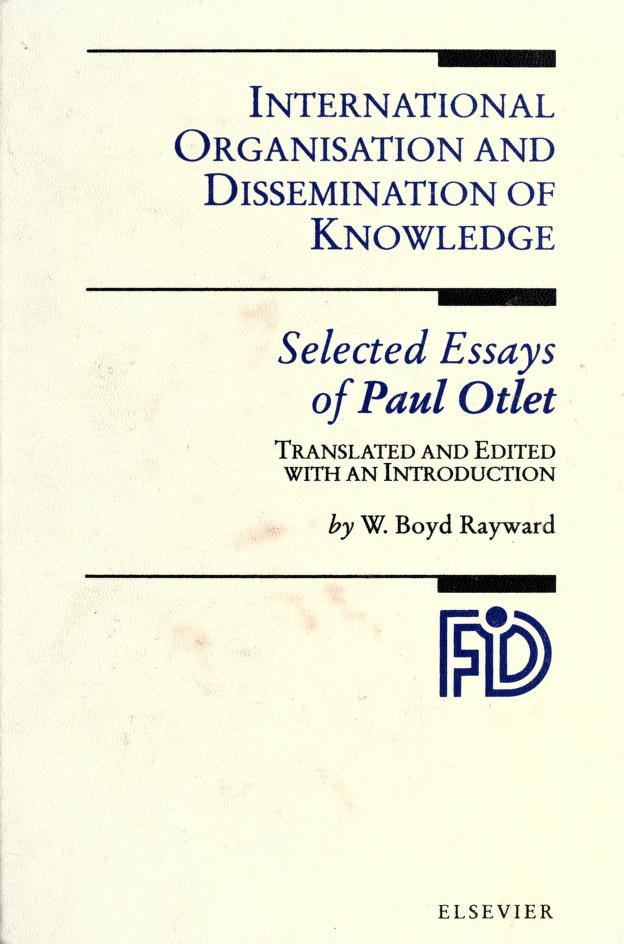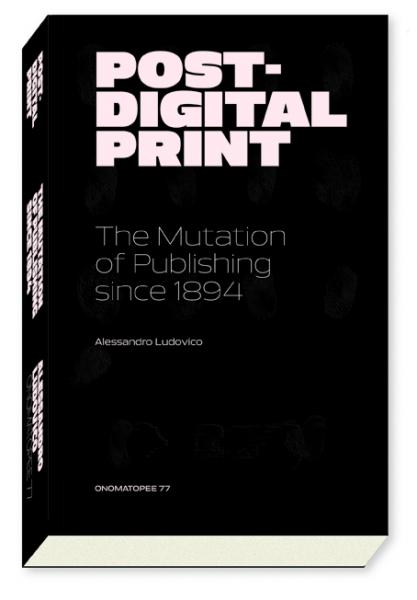Paul Otlet: International Organisation and Dissemination of Knowledge: Selected Essays (1990)
Filed under book | Tags: · bibliography, book, knowledge, knowledge production, library

“These translations of a selection of Paul Otlet’s writings have been a long time in preparation. Now put down, now taken up again over a period of ten years or so in Chicago, London and Sydney, they are dispatched at last to Amsterdam with relief. They follow an earlier biographical and institutional study of Otlet and the International Institute of Bibliography (now FID, the International Federation for Information and Documentation). The publication of that work left me with a troubled sense of more that needed to be done, of an obligation incurred but not yet discharged. It has always seemed to me that, though not entirely neglected, Otlet’s contributions to our understanding of bibliography, documentation and what is now called information storage and retrieval, sometimes information science, and the technical and institutional arrangements needed to maximise their social utility, have not had the attention in the English-speaking world that is their due. It is my hope that the availability of this selection of papers in English, both in themselves and because of the attention that the act of publication can engender, will encourage a renewal of interest in Otlet’s thinking about and work for the international organisation and dissemination of knowledge.”
Translated and edited, With an introduction by W. Boyd Rayward
Publisher Elsevier, 1990
FID Publication series, 684
ISBN 0444886788, 9780444886781
256 pages
PDF, PDF (updated on 2019-6-6)
multiple formats (Internet Archive)
Alessandro Ludovico: Post-Digital Print: The Mutation of Publishing Since 1894 (2012–) [EN, IT]
Filed under book | Tags: · archive, book, e-book, filesharing, library, networks, print, publishing, reading, text, writing

“In the post-digital age, digital technology is no longer revolutionary but a normality, everywhere. For music or film, circulation as bits and bytes, downloads and streams are no longer a big deal. But for the world of book and magazine publishing, change has just begun.
New ways of networked and electronic publishing had been envisioned by avant-garde artists, activists and technologists for more than a century. Even though in hindsight the reports of the death of paper were greatly exaggerated, electronic publishing has now become a reality. How will analog and digital coexist in the post-digital age of publishing? How will they transition, mix and cross over?
In this book, Alessandro Ludovico rereads the history of avant-garde arts as a prehistory of cutting through the opposites of paper and electronics. He covers, among others, artists’ books and manifests, zines, net art and experimental publishing projects, up to e-readers and print-on-demand.”
With Afterword by Florian Cramer
Publisher Creating 010, Hogeschool Rotterdam & Onomatopee, Eindhoven, May 2012
Onomatopee 77: Cabinet Project
Creative Commons Attribution-NonCommercial-ShareAlike 3.0 Unported License
ISBN 9789078454878, 9078454873
192 pages
via Florian Cramer
Interview with author: Teresa de Andrés (VisualMag, 2012).
Reviews: Franz Thalmair (Springerin, 2012), Regine Debatty (We Make Money Not Art, 2013), Rob Myers (Furtherfield, 2013), Paul Prudence (Neural, 2013), brnrd.net (2013), Kate Cunningham (Yapp, 2014), Eloïse Cariou (Critique d’art, 2016, FR), Benjamin Caraco (BBF, 2017, FR).
Book launch (Eindhoven, 2012)
Post Digital Print (series of activities around the publication, 2012)
Book website
Publisher (EN)
Publisher (IT, archived)
WorldCat (EN)
Wikipedia
Post-Digital Print (English, 2012, updated on 2012-5-31 to the latest version of the book, Internet Archive)
Post-digital print. La mutazione dell’editoria dal 1894 (Italian, trans. Alessandro Ludovico and Rosa Antonicelli Verrelli, 2014, added on 2020-6-3)
Markus Krajewski: Paper Machines: About Cards & Catalogs, 1548-1929 (2002/2011)
Filed under book | Tags: · library, media archeology, media history, storage

Today on almost every desk in every office sits a computer. Eighty years ago, desktops were equipped with a nonelectronic data processing machine: a card file. In Paper Machines, Markus Krajewski traces the evolution of this proto-computer of rearrangeable parts (file cards) that became ubiquitous in offices between the world wars.
The story begins with Konrad Gessner, a sixteenth-century Swiss polymath who described a new method of processing data: to cut up a sheet of handwritten notes into slips of paper, with one fact or topic per slip, and arrange as desired. In the late eighteenth century, the card catalog became the librarian’s answer to the threat of information overload. Then, at the turn of the twentieth century, business adopted the technology of the card catalog as a bookkeeping tool. Krajewski explores this conceptual development and casts the card file as a “universal paper machine” that accomplishes the basic operations of Turing’s universal discrete machine: storing, processing, and transferring data. In telling his story, Krajewski takes the reader on a number of illuminating detours, telling us, for example, that the card catalog and the numbered street address emerged at the same time in the same city (Vienna), and that Harvard University’s home-grown cataloging system grew out of a librarian’s laziness; and that Melvil Dewey (originator of the Dewey Decimal System) helped bring about the technology transfer of card files to business.
The book is an extended and updated version of the original ZettelWirtschaft published in German by Kulturverlag Kadmos Berlin, 2002
Translated by Peter Krapp
Publisher MIT Press, 2011
History and Foundations of Information Science series
ISBN 0262015897, 9780262015899
215 pages
review (Tom Wilson, Information Research)
review (Tomáš Dvořák, Teorie vědy, in Czech)
PDF (updated on 2012-9-27)
Comment (0)
